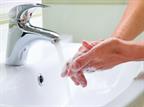Infection in the Nose, Throat, and Airways (Upper Respiratory Infection) in Infants: What to Know
An upper respiratory infection (URI) affects the nose, throat, and upper airways that lead to the lungs. The most common type of URI is the common cold.
URIs usually get better on their own. Medicines can't cure URIs, but you can do things to help your baby feel better. URIs in babies may last longer than they do in adults.
What are the causes?
A URI is caused by a germ called a virus. Your baby may catch a virus by:
Breathing in droplets from someone's cough or sneeze.
Touching something with the virus on it and then touching their mouth, nose, or eyes.
What increases the risk?
Your baby is more likely to get a URI if:
What are the signs or symptoms?
A URI may cause:
Runny or stuffy (congested) nose. This may cause problems with sucking while feeding.
Cough or sneezing.
Ear pain. Pulling on the ear may be a sign of this.
Fever.
Being less active.
Not wanting to eat or drink.
Changes in sleep or being fussy.
How is this diagnosed?
A URI may be diagnosed based on:
Your baby's health care provider may also use a swab to take a mucus sample from your baby's nose (nasal swab). This sample can be tested to see what virus is causing the illness.
How is this treated?
URIs usually get better on their own within 7–10 days. Babies with URIs are not usually treated with medicine. Medicines or antibiotics can't cure URIs. You can take steps to relieve your baby's symptoms.
Follow these instructions at home:
Medicines
-
Give your baby medicines only as told.
-
Do not give your baby cold medicines. These can have serious side effects for children younger than 6 years of age.
- Talk with your baby's provider:
-
Do not give your baby aspirin. It can make your baby very sick.
Relieving symptoms
- Use saline nose drops (nasal drops) to help relieve a stuffy nose. Put one drop in each nostril as needed.
-
Use a bulb syringe to suction mucus out of your baby's nose. Do this after putting in nose drops. Put a drop into one nostril, wait for 1 minute, and then suction the nose. Then do the same for the other nostril.
- If your baby is 1 year old or older, a teaspoon of honey before bed may help lessen coughing at night.
-
Use a cool-mist humidifier to add moisture to the air. This can help your baby breathe easier.
General instructions
-
Give your baby more fluids as told.
-
Clean your baby's nose gently with a moist, soft cloth. Use saline drops to wet the area first.
-
Use a cream or balm to help heal dry skin around your baby's nose.
-
Keep your baby home from daycare if they have a fever.
-
Keep your baby away from secondhand smoke.
-
Make sure your baby gets regular shots, including the flu shot if they're older than 6 months.
How to prevent the spread of infection to others
URIs spread easily. To help stop the spread:
Wash your hands often with soap and water for at least 20 seconds. If you can't use soap and water, use hand sanitizer.
Avoid touching your baby's mouth, face, eyes, or nose.
Have everyone at home wash their hands often.
Clean all surfaces and doorknobs.
Contact your baby's health care provider if:
Contact your child's provider right away if:
Your baby is younger than 3 months old and has a temperature of 100.4°F (38°C) or higher.
Your baby is 3 months old or older and has a temperature of 102.2°F (39°C) or higher.
Your baby has a fever, and they look or act sick in a way that worries you.
Your baby is sleeping a lot more than usual.
If you can't reach the provider, go to an urgent care or emergency room.
-
Your baby is breathing very fast.
-
Your baby makes grunting sounds while breathing.
-
The spaces between and under your baby's ribs get sucked in while your baby inhales. This may be a sign that your baby is having trouble breathing.
-
Your baby makes high-pitched whistling sounds when breathing. This is called wheezing.
-
Your baby's skin or nails look gray or blue.
- Your baby has signs of dehydration, which is when there's not enough water in their body. Signs include:
These symptoms may be an emergency. Do not wait to see if the symptoms will go away. Call 911 right away.
This information is not intended to replace advice given to you by your health care provider. Make sure you discuss any questions you have with your health care provider.

